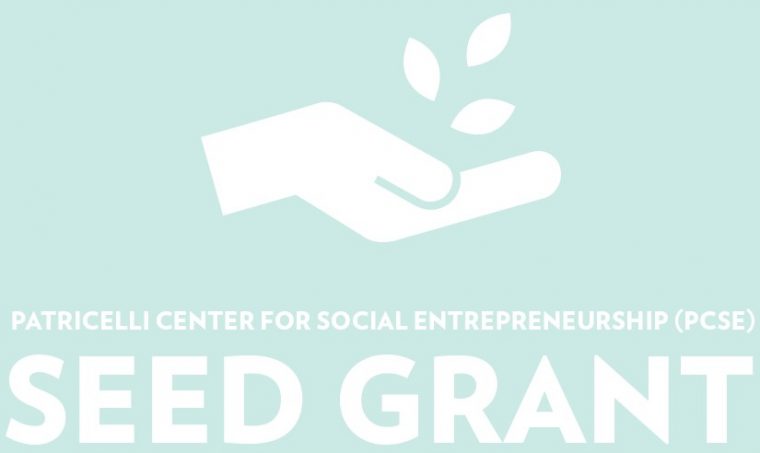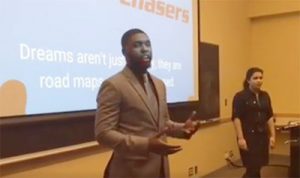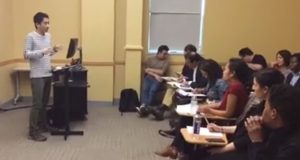Patricelli Center Awards Seed Grants to 3 Student-Led Ventures


On Feb. 27, three student-led social impact projects received a Patricelli Center for Social Entrepreneurship 2017 seed grant. The Patricelli Center will award these ventures with $5,000 each in unrestricted funds as well as training, advising, mentoring, incubator workspace and other resources from the Patricelli Center.
Recipients were selected from a pool of finalists who submitted written business plans and pitched to a panel of expert judges comprised of alumni, parents, students, faculty and community partners. Applicants were assessed on their project design, leadership qualities and potential for social impact.
The 2017 Seed Grant recipients are:
Dream Chasers led by AJ Wilson ’18, Rhea Drozdenko ’18, Julian Payne and Celina Cotton is a registered non-profit organization dedicated to closing the academic and opportunity gaps in the South and Midwest through peer mentorship, events and workshops, and community engagement.
“Every student needs a peer mentor,” Wilson said. “We believe students need the ability to create, innovate, and work with and for their peers. We also believe students need a safe and nurturing environment that allows them to pursue any academic dream they desire. Our vision is for students to realize no dream is too large or too impossible to pursue.”
 Dream Chasers offers an after school mentoring program which pairs middle schoolers with high school student mentors, and high schoolers with college student mentors. In addition, Dream Chasers help students find scholarship opportunities; organize monthly student-led leadership service projects; and offer events and workshops to benefit not only students, but the community at large.
Dream Chasers offers an after school mentoring program which pairs middle schoolers with high school student mentors, and high schoolers with college student mentors. In addition, Dream Chasers help students find scholarship opportunities; organize monthly student-led leadership service projects; and offer events and workshops to benefit not only students, but the community at large.
“Our model combines both student-led peer mentoring with leadership and academics,” Drozdenko said. “Not only do we provide students with agency and independence, we also provide them with strong academic and college readiness components.”
 The Appalachian Scholar Project by Dennis White ’19 intends to transform rural American communities by improving access to the nation’s best universities. White, a Posse Veteran Scholar, will combine a cohort of 10 high school students from West Virginia, the least educated state in the country, and offer them mentoring so they can attend a leading college or university. The Appalachian Scholars would receive a four-week bootcamp to boost their critical readings and writing skills. Afterwards, the scholars would receive college search mentoring remotely, either from team members at Wesleyan or at other universities.
The Appalachian Scholar Project by Dennis White ’19 intends to transform rural American communities by improving access to the nation’s best universities. White, a Posse Veteran Scholar, will combine a cohort of 10 high school students from West Virginia, the least educated state in the country, and offer them mentoring so they can attend a leading college or university. The Appalachian Scholars would receive a four-week bootcamp to boost their critical readings and writing skills. Afterwards, the scholars would receive college search mentoring remotely, either from team members at Wesleyan or at other universities.
“West Virginia’s problems tend to become the rest of the country’s problems,” White said. “It’s a large population, but we can have a big impact with just 10 students at a time. You can imagine what would happen if you found 10 poor rural students to get them to go to a place like Harvard or Yale and the impact this would have on the country.”

Move and Connect by Shingo Umehara ‘18 and alumni Kotaro Aoki ’16 and Kaito Abe ‘15, is a platform in Tokyo, Japan where people across different occupations and over different generations will learn to communicate through artistic expression, body movement and critical engagement with history and culture.
While a student in Japan, Umehara and his peers were not expected to ask questions in school or express themselves in writing. “Asking a question. It’s an oddity in classrooms. An oddity in Japan is the worst thing you can be. You want to go along with the room You don’t want to be the disturbance,” he said.
While at Wesleyan, Umehara took three classes with Eiko Otake, visiting artist in dance and the College of East Asian Studies, and learned the importance of “striping away your verbal thoughts and get(ting) in contact with people on a physical level.You understand yourself in a physical place, (an) alternative form,” Umehara said.
His grant-funded project, Move and Connect, is based on Otake’s classes at Wesleyan, and will allow 20 participants to attend three weekend workshops in Japan that explore movement and mass destruction. “We use mass destruction as a topic to engage and focus on the atomic bombings and nuclear accidents in Fukishima. You have to talk to discuss their pain. We will discuss the people who cannot speak for themselves,” Umehara explained.
“A liberal arts education combined with creative art workshops can create active agents and unite people with different backgrounds,” he said.
The grantees full pitch proposals are online here.
“These students and teams exemplify the spirit of innovation and impact shared by so many members of the Wesleyan community,” said Makaela Kingsley, director of the Patricelli Center for Social Entrepreneurship. “They follow in a long line of successful Wesleyan-connected social projects and enterprises. We wish them well as they launch or scale their work, and we stand by to support their endeavors going forward.”
Read about past Patricelli Center seed grant recipients online here.

